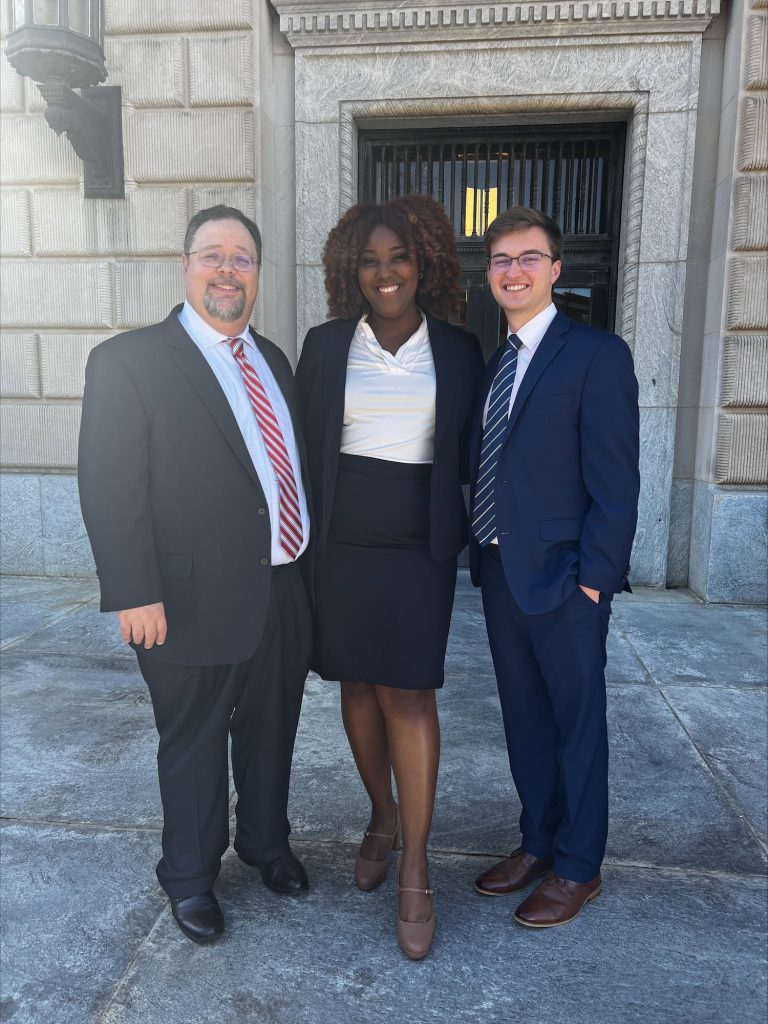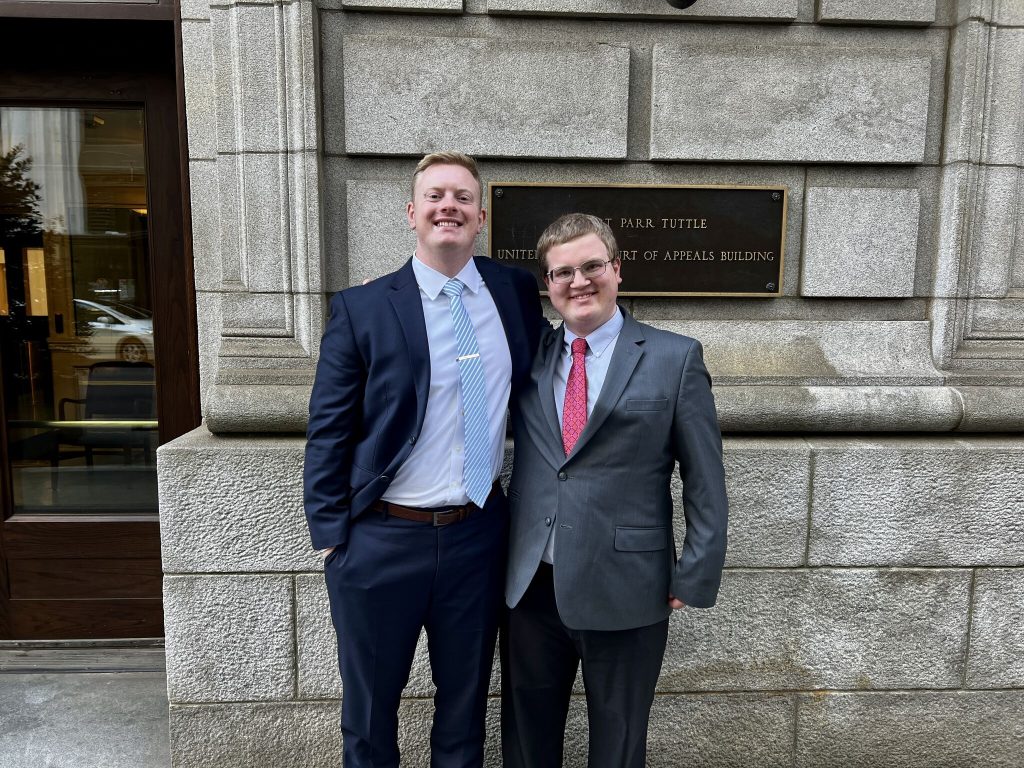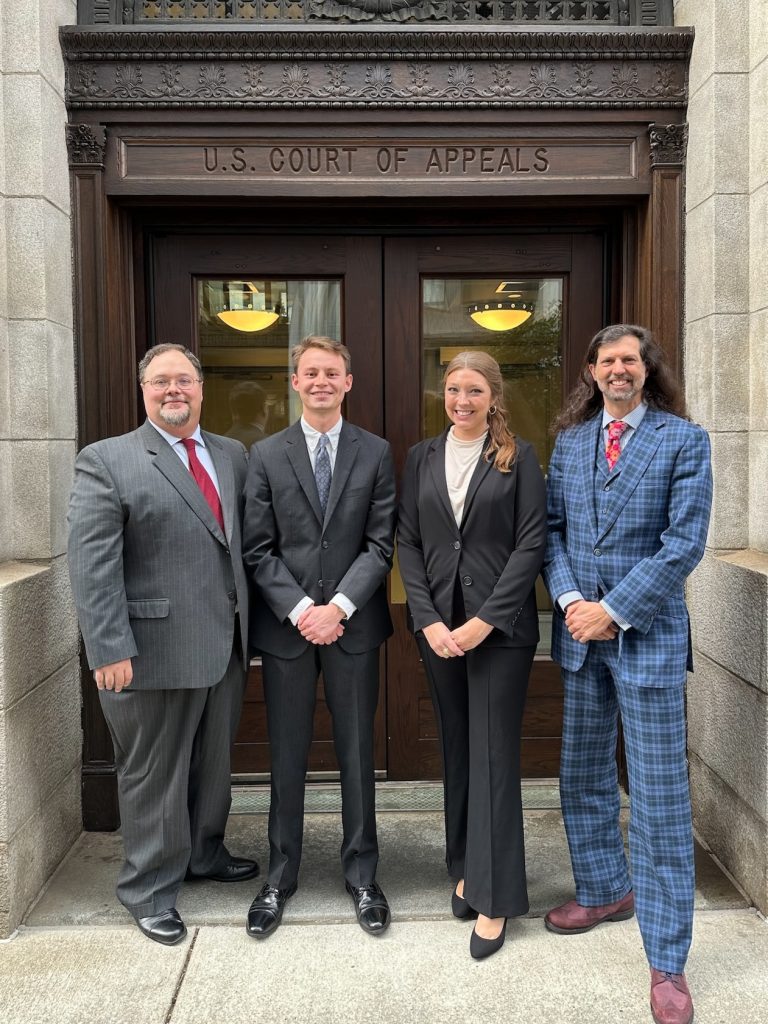This academic year, four pairs of students have been invited to travel to the U.S. Court of Appeals for the Eleventh Circuit to present oral arguments as part of their service to The University of Alabama School of Law’s Appellate Advocacy Clinic. Since November, three pairs have already presented their arguments, and the fourth set will do so later this semester. The clinic, run by Professor Travis Ramey, is one of seven that provides students the chance to serve the community while gaining hands-on experience under a licensed attorney. The students were appointed to their respective cases by Judges Andrew Brasher, Charles R. Wilson, Elizabeth L. Branch, and Robin S. Rosenbaum.
“Many young attorneys wait years for an opportunity to argue an appellate case,” said Professor Ramey. “The chance to argue a case during law school gives alumni of the Clinic a substantial advantage over their peers as they begin their legal careers.”
Students who were invited to argue cases before the Eleventh Circuit include the duos of Camdyn Neal and Cooper Moran, Alli Swann and Dalton Counts, Christopher Alhorn and Sanderson Wall, and Tyger Quarles and Carson Freund. Arguing before a federal appellate court marks a significant advancement in the professional and academic careers of each participant. Their cases covered topics spanning from claims of qualified immunity to the Americans with Disabilities Act. By taking advantage of the opportunity offered by the Appellate Advocacy Clinic, these students have asserted themselves as competitive and knowledgeable representatives in the legal world.
Presenting an oral argument before the Eleventh Circuit was an incredibly rewarding experience and a testament to the opportunities available as a student at Alabama Law.
Alli Swann

Camdyn Neal & Cooper Moran – Claims of Qualified Immunity
Camdyn and Cooper’s argument contributed to deliberation on a decision regarding whether two police officers were legally entitled to claims of immunity after infringing upon a client’s Fourth Amendment rights. Judge Charles Wilson, who headed the panel of judges during the case, commended the students and the Clinic for Neal and Moran’s successful delivery of their oral argument.
“Working on this appeal with Cooper and Professor Ramey was an honor. Cooper and I had many family and friends attend our Oral Argument and it was incredible that they got to watch such an amazing moment in our career,” said Camdyn Neal.

Sanderson Wall & Christopher Alhorn – Ineffective Assistance of Counsel Claims
Sanderson and Christopher were tasked with arguing a claim of incompetent counsel that arose from a situation faced by an asylum-seeker during his application process. After the client’s petition for asylum was rejected, he brought his case to the Board of Immigration Appeals. Alhorn and Wall argued that their client properly filed a complaint with the appropriate disciplinary authorities.

Alli Swann & Dalton Counts – Americans with Disabilities Act
Another case, argued by co-counsel Alli Swann and Dalton Counts, related to the wrongful application of Section 302 of the Americans with Disabilities Act. Swann and Counts argued that the applicable ADA mandate in their client’s case was Section 309, which states that disabled examinees are entitled to equal opportunities to exhibit their knowledge on an exam as non-disabled test takers.
Tyger Quarles & Carson Freund – First Amendment
Tyger and Carson will argue that their client’s First Amendment rights, specifically Freedom of the Press, were infringed upon, and they will argue that the First Amendment protects the right to record public officials in public places. They will present their argument in May.
These Eleventh Circuit cases a reflection of the many unique opportunities available to Alabama Law students through the Law School’s clinics. Though the cases argued by the students varied in particulars, the six students who have thus far appeared before the Eleventh Circuit agree that their experiences represent a significant highlight in their law school journeys and would not have been possible without the Appellate Advocacy Clinic.
Story by Kaci Lollar